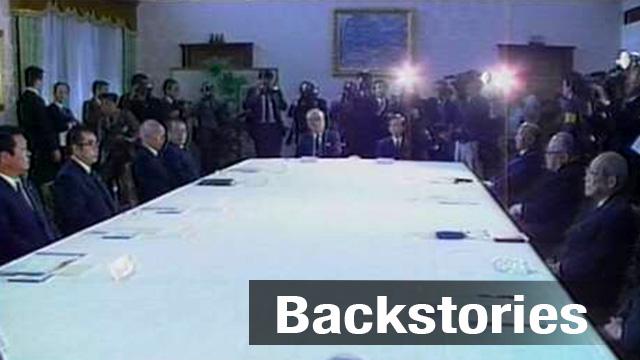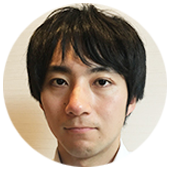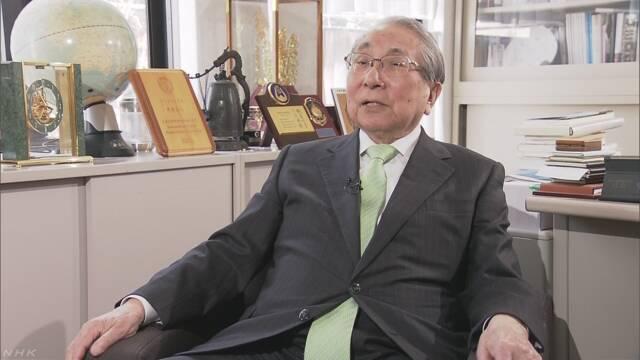
The discussions at the panel meeting have been kept confidential and no minutes are said to exist.
But as the Heisei era nears its close, Nishihara agreed to an NHK interview and revealed for the first time the details of the panel meeting and the name selection process.
When the law on naming an Imperial era was established in 1979, it didn't include seeking the opinion of outside experts.
However, at the time of changing the era name from Showa to Heisei, some officials in the cabinet of then Prime Minister Noboru Takeshita argued that the process should involve hearing opinions from the public.
The cabinet agreed and set up the first panel comprising eight people from academia, the media and other fields to assist the selection process.
Confidential meeting
An official tasked with preparing the current name selection panel says there are no detailed records of the last panel, likely because the preparations were done in strict secrecy.
Many members of the panel have since died. Nishihara, who is now 91 years old, was at the time head of the Federation of Japanese Private Colleges and Universities Associations.
He explained in the interview that government officials urged that the discussions at the panel be kept confidential.
"If something bad had happened after disclosure of the discussions, some might have argued that another era name would have been better," says Nishihara. "Now that a new era is about to begin, I hope my experience will be used for good."
Secret Preparations
After Emperor Showa passed away on January 7, 1989, the government called together the panel. However, the names of the people appointed only became known when they were entering the prime minister's office the same day.
So when did the preparations begin? Nishihara says that almost a year earlier in February 1988, a government official visited Waseda University's campus.
"Mr. Teijiro Furukawa, an aide to then Chief Cabinet Secretary Keizo Obuchi, came to the campus, which was closed as it was an entrance exam period. He wanted me to keep everything secret, even about being asked to become a panel member," Nishihara says.
"When I read again the notebook I carried, I found I had written little on what we spoke about even though I had a habit of keeping notes."
He says he never discussed the matter even with his family, so when they went out together, he sometimes hid a suit and a tie in his bag in case he was suddenly called to the prime minister's office.
Another panel member, who declined to be identified, recalled receiving a telephone call from a government official around September 1988, or seven months after Nishihara had contact with Furukawa. At that time, the health of Emperor Showa worsened abruptly. The individual was also asked to keep the matter secret.
The end of Showa
When Emperor Showa passed away at 6:33 a.m. on January 7, 1989, government officials activated the carefully prepared panel.
The same morning, Nishihara received a phone call from a government official, who told him to come to the prime minister's office by 30 minutes after noon. Nishihara says he then told his family what was happening.
He says he felt deeply mournful at the time, but also felt a rising tension. He said he remembers thinking: "Today is a day of critical importance." Nishihara first went to the university to gather himself and then went to the prime minister's office.
Footage taken by NHK at that time shows Nishihara looking quite nervous, as he walked quickly into the office.
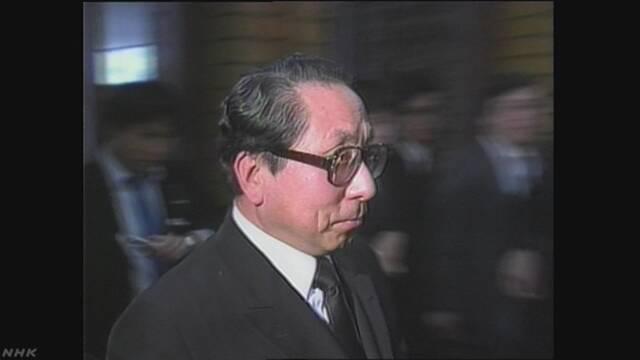
He says he hadn't been informed of other members of the panel and met them for the first time as he entered the meeting room.
"All members were in the top levels of their field so were accustomed to high level meetings. The atmosphere was solemn, quiet and tense. I was born in the third year of the Showa era, and was 60 years old at that time. I can call myself a man of the Showa era. I thought such a man would play a role in closing it."
He says he was acquainted with some of the other panel members, but the atmosphere prevented them from talking before the meeting began.
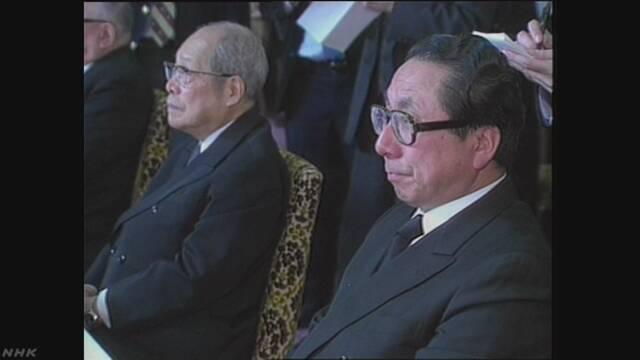
What happened at the meeting?
According to Nishihara and others, two envelopes -- one brown and one white -- were on the desk. The brown envelope contained a document on the selection process. The white one contained a sheet showing three candidates -- Heisei, Shubun, and Seika.
"I do not clearly remember in what fashion the words were written on the document, but I have a memory that Heisei was on the top of the sheet," Nishihara says.
"I had an impression that it might be the government's first candidate."
The meeting proceeded with Junzo Matoba, chief of the Cabinet Councilors' Office on Internal Affairs, asking the members to present their opinions about the candidates. No one spoke for some time in the tense atmosphere, but one of them then expressed a preference for Heisei. Many others agreed.
Nishihara said he then spoke and explained he did not oppose choosing Heisei, but raised other considerations.
"I argued, 'Meiji and Showa sound compact, while Heisei sounds relatively loose. It evokes the era of Taisho, which did not have strong characteristics, and it would create the impression that the new era would last for only a short period. Isn't it necessary to consider that point.'" The Emperor Taisho ruled from 1912 to 1926.
Another member supported Nishihara's point.
Deciding on Heisei
The discussions continued for about an hour and half, until Matoba asked the members if he could understand that they reached consensus on Heisei. They nodded in agreement.
Why did no one endorse "Shubun" or "Seika?" Why did the members favor Heisei?
"I think the major factor was past wars," says Nishihara.
"The Japanese experienced wars in the eras of Meiji, Taisho and Showa, while the nation had been at peace for four decades since the end of the Second World War. The Japanese had a strong desire not to go back to the times of war. Heisei's two Chinese characters can be interpreted as a peaceful era without war. They seemed to agree that Heisei would be an ideal name for the new era."
Nishihara disagrees that the government had already decided on the name.
"I don't think that was the case. The panel made the decision independently."
It seems from Nishihara's explanation that the members shared opinions and reached a consensus, rather than holding a debate and voting.
This is similar to the Imperial House Council meeting in December 2017 to decide the dates for the Emperor's abdication and the Crown Prince's accession. The Council members reached consensus without voting .
End of an era
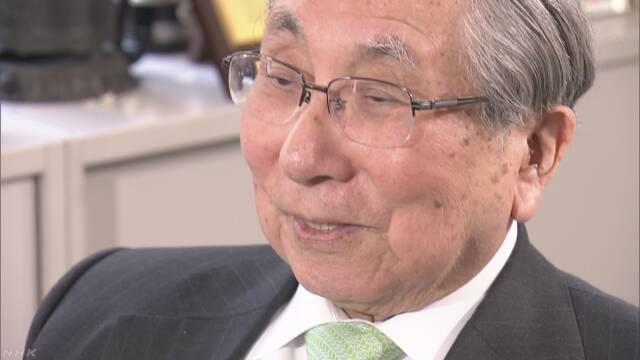
Nishihara explained his thoughts on the Heisei era.
"In the meeting, we discussed what the new era would be like. While my views were wrong in one sense, they were correct in others. I thought the new era might be short like Taisho, but as it turned out, Emperor Akihito has stayed healthy and fulfilled his duties as the symbol of the state.
"We were afflicted by natural disasters, but looking back, I don't think Heisei had strong characteristics or uniqueness. But having no strong characteristics does not mean Heisei was an unhappy era. While I feel sympathy for the people affected by natural disasters, many Japanese enjoyed normal day-to-day lives without war. Since I have experienced war, I think an era when people were able to live normal lives is an extremely fortunate one."
As for the new era about to begin and its name?
"I don't have the energy to think about that. I am satisfied just to have been involved in the beginning of Heisei and to see its end." He said, "I leave the matter of new era to the people who will live in that future."
